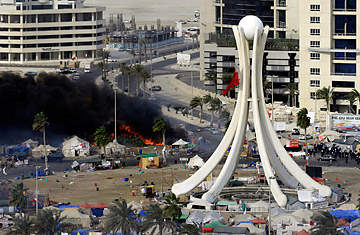
Tents are seen engulfed with fire as Gulf Cooperation Council (GCC) forces move into Pearl Square to evacuate anti-government protesters, in Manama March 16, 2011.
Updated: Apr. 28, 2011 at 7:30 a.m. EST
The seven men who went on trial in Bahrain on Thursday have made history as the country's first-ever civilians to be tried before a military court. Facing the death penalty, they've been sequestered in an unknown location for weeks and accused of murdering two policemen by running them over with a car. They've had no communication with family or friends since being taken into custody last month. Human rights activists fear they have been subjected to torture. More worrisome, they have been denied access to legal counsel and face trial proceedings sealed to the public. The Bahrain News Agency said the seven men have pleaded not guilty to all charges against them.
It is the first trial to be publicly announced since the country fell under martial law on March 15, when the Sunni regime (and U.S. ally) began a severe crackdown on the opposition, a campaign that has seen about 500 mostly Shi'a anti-government supporters arrested and held incommunicado. "Putting civilians to military court is a surprise," says Nabeel Rajab, head of the Bahrain Center for Human Rights. "The government has taken it too far." Rights advocates fear that a conviction in this case may start a wave of death penalties for activists in the island Kingdom, which has rarely imposed such a sentence. The last time Bahrain handed out a death penalty was two years ago. (And according to state media, the military court in Bahrain convicted four Shi'ite protesters and sentenced them to death for the killing of two policemen during anti-government demonstrations last month in the Gulf kingdom. The three other Shi'ite activists, who were also on trial, were sentenced to life in prison for their role in the policemen's deaths.)
Under martial law, almost all civil liberties have been curtailed — as well as judicial recourse. The April 15 arrest of prominent defense attorney Mohammed al-Tajer sent a chill through the opposition: he is now incarcerated alongside many of his clients. "We have this legal black hole where no one knows what their rights are, what their access is, and they're really at the mercy of the regime," says Shadi Hamid, director of research at Brookings Doha Institute. "Essentially, legal protection is suspended — this is a part of martial law. Almost anything can be justified under the pretense of 'national security.' So all bets are off, and it should be very worrying to the opposition."
Bahrain's military prosecutor said the seven men are being tried under a 2006 anti-terrorism law which mandates the death penalty. The statue has long been criticized by international rights groups as being vague, providing a too-broad definition of what qualifies as terrorism (as in its reference to "threats to national unity"). "Anything interfering with the government's sway can be labeled 'terrorism,'" says Joe Stork, deputy director the Middle East and North Africa at Human Rights Watch. "So the risk of a capital sentence is very great."
Though little is known about how country's military courts operate, proceedings will likely mirror those of Bahrain's state security court, where human rights activists say government-forced confessions were often the sole basis for conviction. That court, which was allowed to detain prisoners without trial for a period of three years, was abolished by the king in 2001 as a gesture of political reform. "What we're seeing is unprecedented in recent Bahrain history, and that's what makes it so frightening," says Hamid. "The regime has given up all pretense of wanting any kind of reform."
